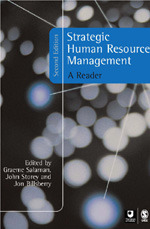Strategic Human Resource Management
Theory and Practice
- Graeme Salaman - The Open University
- John Storey - Open University, UK
- Jon Billsberry - The Open University
Human Resource Development
This volume moves beyond strategic human resource management from the perspective of the policy setter. The book informs but also questions and, while recognising the legitimacy and importance of management perspectives, also captures the experience of workers on the receiving end of strategic initiatives. Students will be encouraged to consider core issues and difficult questions, such as:
" How should employees respond to the missionary zeal of their employers?
" How can we explain the increasing influence of gangmasters?
" What are the effects of management training on the identities of managers?
" Has strategic HRM been transformed from a model of commitment to one of exploitation?
Strategic Human Resource Management has been designed to meet the needs of course teaching at advanced undergraduate and postgraduate levels. It is an invaluable text that will help define the complex agenda of human resource management, strategy and organisations for students.
I found the book explained a few concepts well in addition to the core texts the students are expected to read. For example, that of the resource based view and how it integrates with strategy, decision process and cognition. It also had a good focus on developments in industrial relations (now employee relations) which is a good introduction on this topic for my 3rd year students. Plenty of examples provided and some good reference to other useful texts.
Chosen as recommended reading, as provides an excellent source of critical readings to complement the core text.
Excellent piece of work and this book should be available to all HRM students
Offers a more global perspective in a timely edition. The articulate and thoughtful writing in this text invites students, professionals and sometimes faculty to put aside old mental models of what HR is and can be.
Good theoretical and practical underpinnings.
I like the book a lot. However, you cannot use it as an essential book for the basic HRM course. It has four parts, HRM and knowledge management, HRM and firm performance, new organizational forms, and strategic HRM in practice. I would absolutely recommend this book as "essential" for emerging popular master courses (in many universities nowadays) - "Emerging Issues in HRM". For such a course I would adopt this book as the main one.
